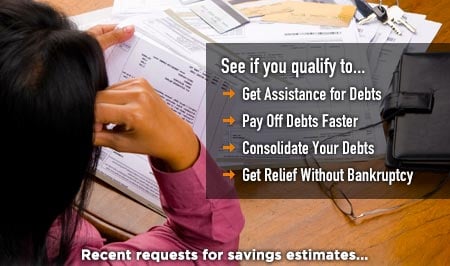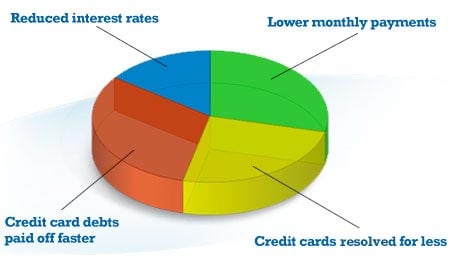
Bad Credit Debt Consolidation Loans
If you have been struggling with high credit card debt that has caused you to fall several months behind on your payments, and you are considering a debt consolidation loan, you're not alone. Many individuals and families in Tennessee and across America are also experiencing their own debt crisis, regularly missing payments, and as a result, are seeing their rating go from good to bad credit. But the good news is, there is help available and you may qualify for debt relief. These days, your available debt relief options may include debt consolidation through a credit counseling agency, debt settlement, debt consolidation loans, or bankruptcy. To help you understand your options, here's an overview:
Debt consolidation or a debt management plan (DMP) typically involves combining, or "consolidating," multiple credit card debts into a single, more structured, and more manageable payment made to a credit counseling agency. Debt settlement allows many consumers who need relief from high-balance credit cards to settle, or negotiate, with their creditors for substantially less than what they originally owe. Finally, debt consolidation loans usually involve combining your high-interest credit card debts into one, lower interest loan. These days, these debt relief methods have become popular alternatives to bankruptcy - which can provide many consumers a new lease on life, but it affects one's credit rating in more damaging and longer lasting ways.
To explore your debt relief options, answer a few, simple questions online and get a free debt relief analysis and savings estimate. Begin.
"How Can Consolidation Help Me?"
As noted earlier, debt consolidation or a debt management plan is a popular debt relief option among many consumers who are searching for a more structured and predictable path to becoming debt-free. Debt consolidation typically involves combining or "consolidating" debts spread across multiple credit cards, as well as other types of unsecured debts like utilities, medical bills, or department store charges, into a single, more affordable, and more manageable monthly payment made to a credit counseling agency.
When you enroll in a debt consolidation program, you can generally expect a one-on-one consultation with a credit counselor who will review your finances, income, and total debt amounts. Once they have a clear picture of your finances and determine a reasonable amount that you can allocate to paying off debts, they will typically design a relief strategy that can hopefully lead to a more lenient and more affordable payment plan. This strategy generally involves submitting proposals (on your behalf) to your creditors asking for reduced interest rates, or the waiving or elimination of any late fees or penalties.
Creditors that agree to the proposals are placed into the debt management plan. The goal of debt consolidation is, with a single, more structured, and more affordable payment plan, you can typically direct more of your payment towards paying off the principal of your loans rather than just the interest. If followed faithfully, you can reduce your debts at a more accelerated pace than if you continued making the monthly payments on your credit card debts at higher interest rates.
"Pay Off Debts with a Loan?"
Depending on their debt situation, many consumers get debt consolidation loans to help pay off their credit card debts. As previously noted, this type of loan typically involves combining high-interest credit card and unsecured debts into one, lower interest loan. Take note: A debt consolidation loan involves taking unsecured debt and paying it off with funds that come by way of a "secured" loan, or a loan where you would have to put up a collateral, like your home or other asset.
Keep in mind that, unlike debt consolidation through credit counseling, debt consolidation loans are generally associated with certain risks. Many consumers who get a debt consolidation loan generally end up using their credit cards again, and accumulate new, high-interest credit card debts to deal with on top of their loan. Under this scenario, a debt consolidation loan has generally made their debt situation go from bad to worse.
In comparing a personal loan with debt consolidation, a loan may be a smart move for disciplined consumers; however, debt consolidation through credit counseling certainly provides many consumers with a more predictable plan and an accelerated path towards becoming debt-free.
State-Sponsored Resources
If you're also struggling financially due to a loss or reduction of income, consider state-sponsored services or programs that are designed for low-income residents. The state of Tennessee offers many programs that can assist you with job training, get access to health care services, and other basic necessities.
In addition, the state's Housing and Development Agency has programs designed to help residents with their housing and mortgage concerns, including avoiding foreclosure.
"Why Do I Need Debt Relief?"
For many budget-conscious consumers, debt consolidation, if followed faithfully, offers a more accelerated and more predictable way to paying off debts. It allows many consumers to save money, reduce interest rates, and waive late fees or penalties. With debt consolidation, the amount of money that you can save every month generally depends on several factors: the total amount of your debts, the current interest rates, and any late fees or penalties.
The bottom line is, if you are struggling with credit card and unsecured debts, there is help available. The first step is to find out what your debt relief options are, compare and contrast their benefits and savings, and determine which program can help you get back on track financially and help you manage your debts. Answer a few, simple questions now to get your free debt relief analysis and savings estimate. Begin now.





















